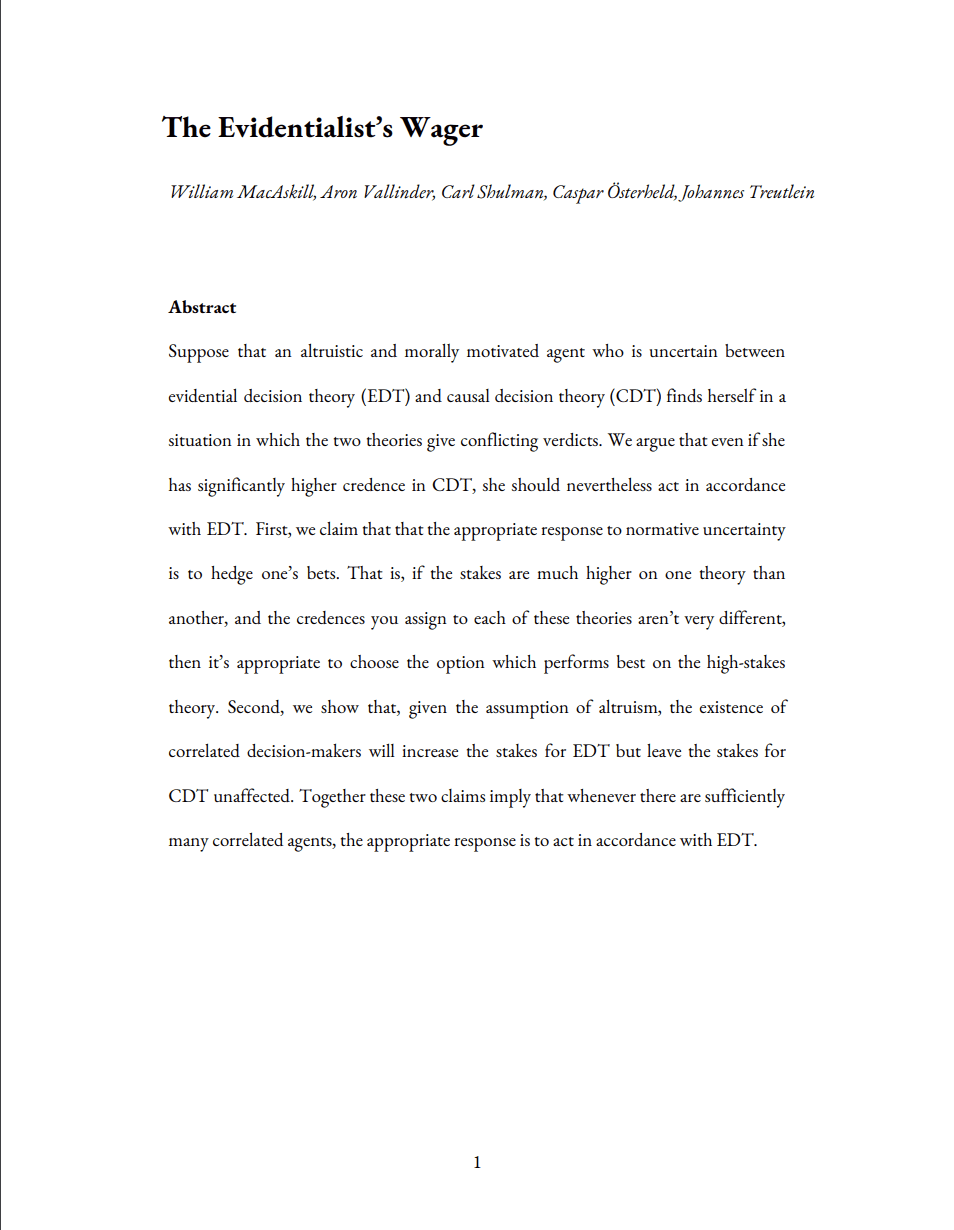The evidentialist’s wager
William MacAskill (Global Priorities Institute, Oxford University), Aron Vallinder (Forethought Foundation), Caspar Österheld (Duke University), Carl Shulman (Future of Humanity Institute, Oxford University), Johannes Treutlein (TU Berlin)
GPI Working Paper No. 12-2019
Suppose that an altruistic and morally motivated agent who is uncertain between evidential decision theory (EDT) and causal decision theory (CDT) finds herself in a situation in which the two theories give conflicting verdicts. We argue that even if she has significantly higher credence in CDT, she should nevertheless act in accordance with EDT. First, we claim that that the appropriate response to normative uncertainty is to hedge one’s bets. That is, if the stakes are much higher on one theory than another, and the credences you assign to each of these theories aren’t very different, then it’s appropriate to choose the option which performs best on the high-stakes theory. Second, we show that, given the assumption of altruism, the existence of correlated decision-makers will increase the stakes for EDT but leave the stakes for CDT unaffected. Together these two claims imply that whenever there are sufficiently many correlated agents, the appropriate response is to act in accordance with EDT.
Other working papers
Moral demands and the far future – Andreas Mogensen (Global Priorities Institute, Oxford University)
I argue that moral philosophers have either misunderstood the problem of moral demandingness or at least failed to recognize important dimensions of the problem that undermine many standard assumptions. It has been assumed that utilitarianism concretely directs us to maximize welfare within a generation by transferring resources to people currently living in extreme poverty. In fact, utilitarianism seems to imply that any obligation to help people who are currently badly off is trumped by obligations to undertake actions targeted at improving the value…
Tiny probabilities and the value of the far future – Petra Kosonen (Population Wellbeing Initiative, University of Texas at Austin)
Morally speaking, what matters the most is the far future – at least according to Longtermism. The reason why the far future is of utmost importance is that our acts’ expected influence on the value of the world is mainly determined by their consequences in the far future. The case for Longtermism is straightforward: Given the enormous number of people who might exist in the far future, even a tiny probability of affecting how the far future goes outweighs the importance of our acts’ consequences…
How effective is (more) money? Randomizing unconditional cash transfer amounts in the US – Ania Jaroszewicz (University of California San Diego), Oliver P. Hauser (University of Exeter), Jon M. Jachimowicz (Harvard Business School) and Julian Jamison (University of Oxford and University of Exeter)
We randomized 5,243 Americans in poverty to receive a one-time unconditional cash transfer (UCT) of $2,000 (two months’ worth of total household income for the median participant), $500 (half a month’s income), or nothing. We measured the effects of the UCTs on participants’ financial well-being, psychological well-being, cognitive capacity, and physical health through surveys administered one week, six weeks, and 15 weeks later. While bank data show that both UCTs increased expenditures, we find no evidence that…

